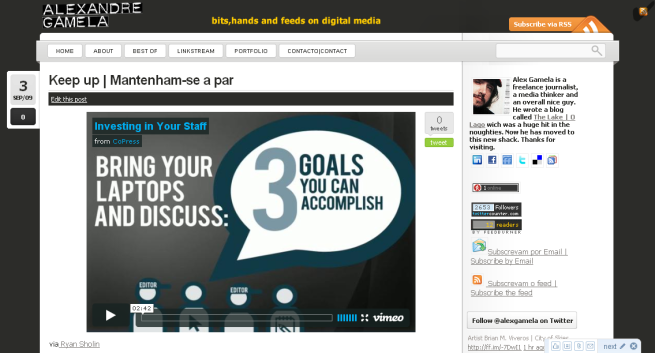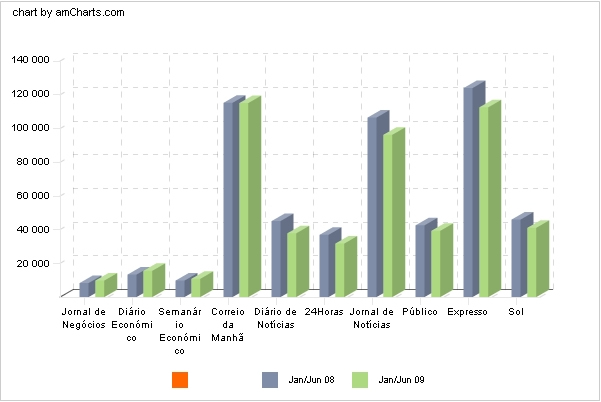|
How different is the relationship with online media for each generation? Are really younger people more active consumers of digital news or are they being surpassed by their parents?
Paula Cordeiro, author of the NetFM blog, is doing a poll on how different generations engage with online media. The results will be presented at the “Media+Generations” conference in Milan, this September 11th and 12th.
I asked Paula what was her percepetion of this reality, even before having the poll results: “Quite clear, and corresponding to the majority of the current news: young people using more than older people, though its growing. Teenagers in social networks, young adults in social networks with professional objectives or match making, on Twitter for the updating and the hype. The teenagers don’t consume news traditionally, but young adults use online media more. Older people use essentially email and the Internet for researches.“
But this trend is not, in Paula’s words “an absolute reality“. In her experience as a teacher there are students with various degrees of contact with online tools, “if there are those who present a simple oral presentation of an assignment using a web hosted presentation, most of them still use a A4 printed sheet, sometimes even, handwritten…”
Their limitations don’t stop here: “Regarding (online media) consumption, they as matter of fact, consume few news under any format or platform, and they aren’t that savvy about the tools that the web has to offer to create and disseminate contents (many don’t know how to create a blog, don’t know about newsreaders or how to make a podcast), going against the general expectations for this generation.“
The poll questions are in portuguese only and you can participate until the September 6th. As soon as Paula Cordeiro has the results, she will publish them on her blog. And we will be looking forward to see them.
|
Até que ponto varia a relação de cada geração com os media online? Serão os mais jovens maiores consumidores de notícias digitais,ou estão a ser ultrapassados pelos seus pais?
Paula Cordeiro, autora do blog NetFM, está a fazer uma sondagem sobre como cada geração interage com os media online. Os resultados serão apresentados na conferência “Media+Generations”, a decorrer nos próximos dias 11 e 12 de Setembro, em Milão.
Perguntei à Paula qual era percepção que tinha desta realidade, mesmo ainda antes de ter os resultados da sondagem: “Muito clara e corresponde à maior parte das notícias que circulam: jovens com grande consumo, mais velhos com menor consumo, embora a crescer. Adolescentes nas redes sociais, jovens adultos nas redes sociais com intuitos profissionais ou match making, no twitter pela actualização e porque é hype. Adolescentes não consomem notícias na forma tradicional, jovens adultos consomem mais notícias através dos media online. Mais velhos usam essencialmente e-mail e Internet para pesquisas.”
Mas esta tendência não é, nas palavras de Paula, “uma realidade absoluta“. Na sua experiência como professora, há estudantes com diferentes graus de contacto com as ferramentas online, “Se há os que preparam uma mera apresentação oral de um projecto de trabalho usando uma apresentação alojada na web, a maioria continua a apresentar uma folha A4 impressa, algumas vezes mesmo, escrita à mão…“
Mas as suas limitações não se ficam por aqui: “Relativamente ao consumo, de facto consomem poucas notícias sob que forma ou plataforma for e não assim tão conhecedores das ferramentas que a rede coloca ao nosso dispor para criação e divulgação de conteúdos (muitos não sabem criar um blog, não conhecem newsreaders ou sabem fazer um podcast), contrariamente aquilo que são as pexpectativas gerais para esta geração.”
Podem responder a esta sondagem até dia 6 de Setembro. Assim que a Paula Cordeiro tiver resultados, eles serão publicados no seu blog. E nós estaremos atentos. |
![]() Subscrevam por Email | Subscribe by Email
Subscrevam por Email | Subscribe by Email![]() Subscrevam o feed | Subscribe the feed (via FeedBurner)
Subscrevam o feed | Subscribe the feed (via FeedBurner)

















Comentários Recentes